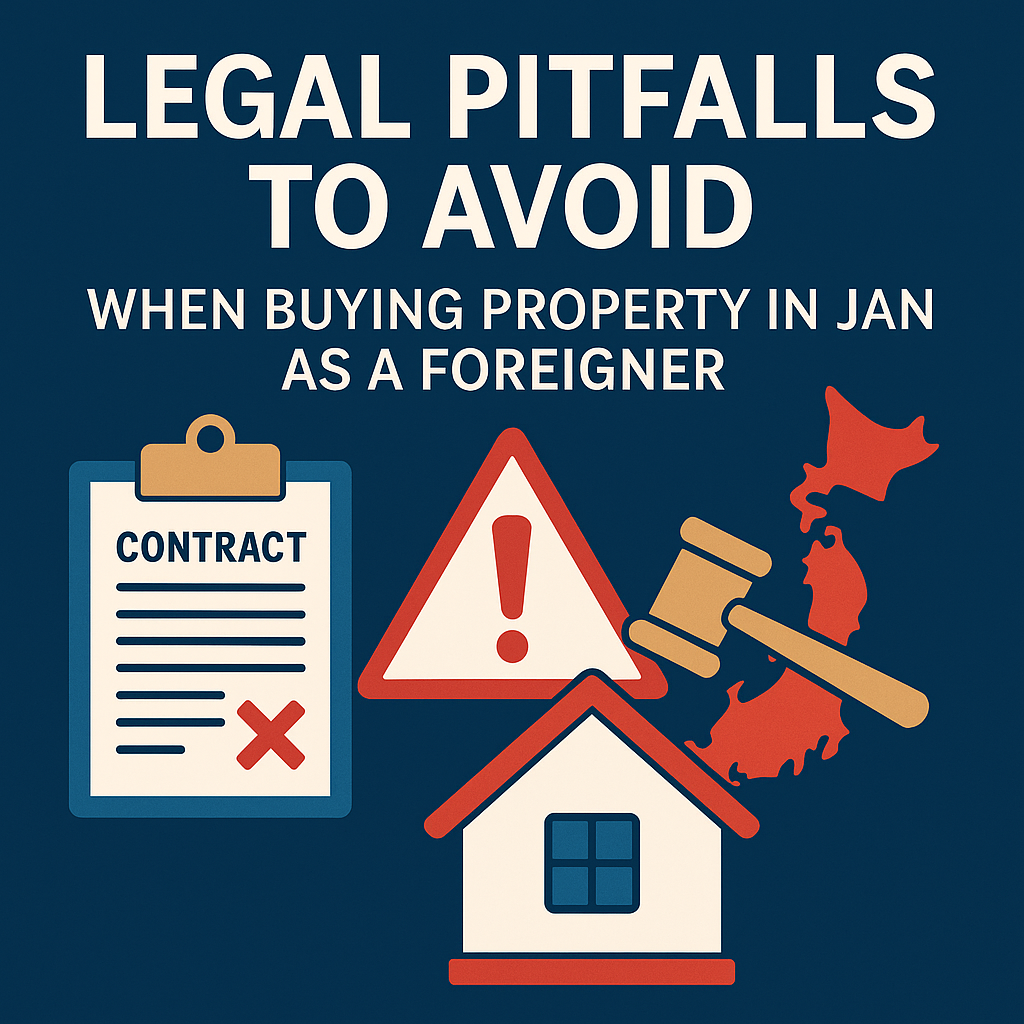Buying property in Japan can be a rewarding investment or a dream-come-true for many foreigners. However, without a strong understanding of the legal framework and local practices, you may encounter unexpected issues. This guide outlines the most common legal pitfalls foreign buyers should avoid to ensure a secure and informed real estate purchase.
1. Understanding Property Ownership Rights in Japan
Japan allows foreigners to purchase freehold property with no nationality restrictions. However, exceptions exist for certain land types, such as agricultural land or properties near military zones, which are regulated under the Foreign Exchange and Foreign Trade Act and Agricultural Land Act.
Freehold vs Leasehold: Most properties are freehold, but leasehold options exist and come with time restrictions and renewal conditions. Always confirm ownership type during due diligence.
2. Boundary and Title Issues
Land boundaries in Japan are not always clear or officially confirmed. Many properties have undetermined boundaries, and disputes can arise with neighbors post-purchase.
Pro Tip: Hire a certified land surveyor to verify boundaries, especially for rural or older properties.
Title checks are critical. Some properties may have unresolved mortgages, liens, or co-ownership issues. A judicial scrivener can help perform title research and ensure legal transfer.
3. Zoning Laws and Building Regulations
Zoning regulations dictate what type of building can be constructed and how it can be used. For instance, some areas prohibit commercial use or have building height restrictions.
In resort areas like Hakuba, additional restrictions may apply due to national park or conservation laws. Setbacks from rivers or roadways can also limit building options.
Tip: Request a zoning certificate from the municipal office before proceeding with a land purchase.
4. Due Diligence on Seller and Property History
Always investigate the seller’s credibility. Some buyers fall victim to transactions with unlicensed agents or third-party intermediaries who misrepresent ownership.
Key checks:
- Verify the seller’s ID and ownership registration
- Ensure property taxes are paid
- Check for tenants or rights of use by others
A thorough property history review can prevent litigation or fraud risks.
5. The Role of Judicial Scrivener
In Japan, the judicial scrivener is essential for registering property transfers. They prepare and file legal documents, confirm the seller’s rights, and register the buyer’s ownership.
Even with a lawyer, hiring a scrivener is recommended for the registration phase. Fees typically range from JPY 80,000–150,000, depending on property complexity.
6. Tax and Inheritance Considerations
Foreigners must pay:
- Acquisition tax (fixed percentage of assessed value)
- Annual fixed asset tax
- Potential capital gains tax upon resale
Inheritance tax applies even to non-resident owners. Japan has a progressive inheritance tax system, and failing to plan ahead may place a burden on your heirs.
Since 2024, Japan mandates name change registration (inheritance registration) within 3 years of inheritance, or risk fines.
7. Verbal Agreements and Missing Clauses
In Japan, verbal promises are not legally enforceable unless documented in writing. Ensure all agreements with sellers, agents, and builders are included in a written sales contract.
Key clauses to include:
- Conditions for cancellation
- Deposit and penalty terms
- Building condition disclosures
8. Choosing the Right Agent
Many issues stem from working with unlicensed or inexperienced agents. Always confirm that your real estate agent holds a valid license issued by the Japanese Ministry of Land, Infrastructure, Transport and Tourism and preferably has experience with foreign clients.
Red Flags:
- Pressuring you to skip due diligence
- Unwilling to provide written documentation
- Avoiding use of judicial scriveners or lawyers
Conclusion: Secure Your Investment by Staying Informed
Buying property in Japan is entirely feasible for foreigners, but it requires awareness and professional support. By avoiding the legal pitfalls listed here and hiring the right professionals, you can ensure a smooth and legally sound purchase.
If you’re considering a property investment in Japan, consult with a trusted local agent, judicial scrivener, and — when appropriate — a lawyer.

Whether you’re looking for a cozy ski chalet, a traditional Japanese home, or land for a custom project, our bilingual team is ready to support you every step of the way.
Interested in learning more about real estate in Hakuba?
 Handn blog
Handn blog 

